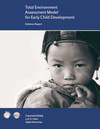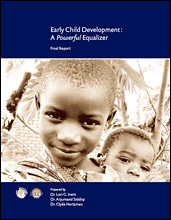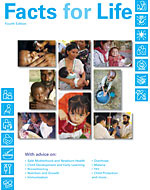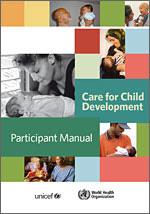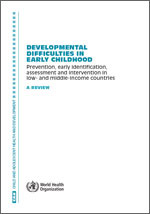
Reviews of the evidence concerning the importance of Early Childhood Development (ECD)
Meena Cabral de Mello
GFMER Coordinator of Early Childhood Development
A series of key international publications on the science of early development and on the technical and empirical evidence related to successful interventions for improving the psycho-social development of young children in the context of resource poor settings.
- Programme on Mental Health, World Health Organization. Improving mother/child interaction to promote better psychosocial development in children. Geneva. World Health Organization, 1998 (WHO/MSA/MHP/98.1).
- World Health Organization. A Critical Link: Interventions for physical growth and psychological development. Geneva. World Health Organization, 1999 (WHO/CHS/CAH/99.3).
- Eshel N, Daelmans B, de Mello MC, Martines J. Responsive parenting: interventions and outcomes. Bull World Health Organ. 2006 Dec;84(12):991-8.
- Richter L, World Health Organization. The role of the health sector in strengthening systems to support children's health development in communities affected by HIV/AIDS: A review. 2006. WHO reference number: 9241594624.
- The Lancet child development in developing countries series. Grantham-McGregor S, Cheung YB, Cueto S, Glewwe P, Richter L, Strupp B; International Child Development Steering Group. Developmental potential in the first 5 years for children in developing countries. Lancet. 2007 Jan 6;369(9555):60-70.
- The Lancet child development in developing countries series. Walker SP, Wachs TD, Gardner JM, Lozoff B, Wasserman GA, Pollitt E, Carter JA; International Child Development Steering Group. Child development: risk factors for adverse outcomes in developing countries. Lancet. 2007 Jan 13;369(9556):145-57.
- The Lancet child development in developing countries series. Engle PL, Black MM, Behrman JR, Cabral de Mello M, Gertler PJ, Kapiriri L, Martorell R, Young ME; International Child Development Steering Group. Strategies to avoid the loss of developmental potential in more than 200 million children in the developing world. Lancet. 2007 Jan 20;369(9557):229-42.
- The Lancet child development in developing countries series 2. Walker SP, Wachs TD, Grantham-McGregor S, Black MM, Nelson CA, Huffman SL, Baker-Henningham H, Chang SM, Hamadani JD, Lozoff B, Gardner JM, Powell CA, Rahman A, Richter L. Inequality in early childhood: risk and protective factors for early child development. Lancet. 2011 Oct 8;378(9799):1325-38.
- The Lancet child development in developing countries series 2. Engle PL, Fernald LC, Alderman H, Behrman J, O'Gara C, Yousafzai A, de Mello MC, Hidrobo M, Ulkuer N, Ertem I, Iltus S; Global Child Development Steering Group. Strategies for reducing inequalities and improving developmental outcomes for young children in low-income and middle-income countries. Lancet. 2011 Oct 8;378(9799):1339-53.
- UNICEF, WHO, UNESCO, UNFPA, UNDP, UNAIDS, WFP and the World Bank. Facts for life. Fourth edition. 2010. ISBN: 9789280644661.
- Ertem IO, Dogan DG, Gok CG, Kizilates SU, Caliskan A, Atay G, Vatandas N, Karaaslan T, Baskan SG, Cicchetti DV. A guide for monitoring child development in low- and middle-income countries. Pediatrics. 2008 Mar;121(3):e581-9.
- Squires J, Bricker D, Potter L. Revision of a parent-completed development screening tool: Ages and Stages Questionnaires. J Pediatr Psychol. 1997 Jun;22(3):313-28.
- World Health Organization. Developmental difficulties in early childhood: prevention, early identification, assessment and intervention in low- and middle-income countries: a review. 2012.




